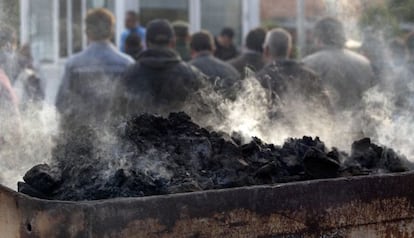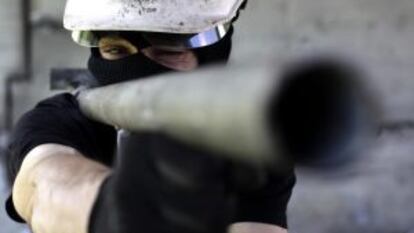The price of coal
Miners have been on strike for three weeks, protesting cuts in a sector on its last legs

Fifty years ago, in the summer of 1962, when Spanish miners in the country's northern region of Asturias launched an unprecedented general strike against General Francisco Franco's military rule, the dictator told his cousin and military secretary, Lieutenant General Francisco Franco Salgado-Araujo, that if Spain were ever admitted to the European Union's forerunner, the European Economic Community, Spain's mining sector would be finished.
Half a century later, the 8,000 miners left in a sector that has seen 40,000 jobs lost in the last two decades are making what may well be the industry's last stand against a process of closures that began, as Franco foresaw, soon after Spain joined the EU in 1986.
On Monday, miners brought the northern region of Asturias to a standstill after calling a general strike there. They have been protesting since May 23, largely ignored by a media focused on the euro crisis, staging a series of walkouts, lock-ins, marches, and involving increasingly violent clashes with police to protest the government's announcement that it is to cut subsidies to the sector.
The miners say that cutting state aid to the sector next year to 111 million euros will deal a fatal blow to an industry that cannot compete in quality or price with Australia, Colombia, Russia, China and the world's emerging coal power, Mozambique. Although Spain's coal industry has shrunk over the years, and its share of electricity generation has dwindled, mining groups say it still accounts for 50,000 direct and indirect jobs.
The coal industry has been living under the threat of extinction since the 1930s
The strikes - backed by mining unions within both of Spain's major labor federations, CCOO and UGT - halted briefly at the end of May to give a tripartite monitoring committee on coal an opportunity to scale back the subsidies. But after six hours of futile negotiations, mineworkers' unions of both federations announced a resumption of the protests.
Even before talks started at the end of May, miners began blocking major road arteries linking northern cities, and 10 miners began sit-ins after their shifts ended at the Candín mine in Oviedo. The premature strikes were spontaneous and not authorized by the unions, but the action reflected the deep frustration felt by Spanish miners over the proposed subsidy cuts. The European Union announced two years ago that member states must end subsidies to the coal sector by the end of 2018, in effect imposing a death sentence on an industry that dates back more than two centuries.
That said, Spain's coal industry has been living under the threat of extinction since the Great Depression of the 1930s, although successive governments have kept the sector alive through subsidies. But Prime Minister Mariano Rajoy's Popular Party (PP) government is determined to enforce a 63-percent subsidy reduction as part of efforts to bring down the public deficit.
Over the years, the PP has made political capital of the Socialist Party's gradual shutdown of the country's coal industry. In 1985, three years after the first Socialist Party government took office, Spain's mining sector employed 53,000 people. Since then, a series of restructuring programs - based mainly on early retirements and limited hiring - has reduced the workforce to around 8,000, working in 47 pits, while production has fallen from 20 million tons to around 8.5 million tons a year. A significant number of those jobs were shed during the PP's two terms in office, between 1996 and 2004.
The PM knows that the miners will have little sympathy outside the region
The wider political situation in Asturias should also be taken into account: in May, after months of negotiations, the PP failed to form a coalition government with renegade conservative Francisco Álvarez Cascos, allowing the Socialist Party and United Left to do so with the support of the single regional deputy from the Progress and Democracy (UPyD) party.
Focused exclusively on resolving Spain's borrowing crisis, Prime Minister Rajoy seems to have decided to cut Asturias loose. At the same time, he knows that the miners' arguments are likely to provoke little sympathy among voters outside the region: their work is still dangerous and dirty, but they are well paid and their working conditions have improved hugely. He will be hoping that Spaniards, weighed down by their own problems, will be unimpressed by news coverage of miners wearing balaclavas firing homemade bazookas and catapulting ball bearings at police from behind barricades made of burning tires.
In the region itself, the road and rail blocks have brought Asturias to a standstill, cutting it off from the rest of the country, and effectively making the population hostages. There have already been injuries: a passenger aboard a local train was badly hurt when it hit a barricade made of tree trunks outside the city of Gijón.
The labor unions have warned that the situation could spiral out of control if a solution is not found to the conflict.
Spanish coal cannot compete with imports and has a low energy content
The protests in Spain are part of the much larger problem of coal's uncertain future in Europe. Part of it has to do with the market. Member states in the EU are not, in general, permitted to subsidize national industries. But because of coal's importance to Spain - it accounts for 30 percent of electricity production - an exception was made in 2002.
Spanish coal is relatively expensive to produce, which is why power plants have resorted to importing almost all the fuel they consume. A law proposed in the fall of 2009 by Socialist Prime Minister José Luis Rodríguez Zapatero, who hails from the mining region of León, offered credits to power plants that bought Spanish coal and guaranteed a certain level of sales, which would help stabilize the sector. The EU blocked the plan, saying it impeded free trade.
Spain has to import about 80 percent of its energy needs and the Socialist Party government said European Union rules allowed up to 15 percent of primary energy used in power generation to be home-produced.
Coal exporters and traders say the European market for steam coal has been shrinking and will continue to do so in the coming years, as aging coal-fired power stations are replaced by gas plants. Furthermore, environmental groups argue that supporting coal runs counter to government pledges to cut greenhouse gas emissions and promote a greener economy, which it says can also create much-needed jobs.
Most of the sector's 8,000-strong workforce is now employed by the private sector, and state coal producer Hunosa has just 1,800 men on its books; at one time it employed 26,000 in Asturias alone. The company has never turned a profit.
Three years ago, when the current crisis had already kicked in, Ignacio Sánchez Galán, the president of electricity company Iberdrola, said that Spanish coal was subsidized to the tune of 90 euros a metric ton, while the price on the international markets was 50 euros a metric ton.
Spanish coal cannot compete with imports and has a low energy content, but as all the main parties admit, it is the only fuel the country can produce domestically in significant quantities. Some kind of strategic reserve is necessary if the country is not to be hostage to the ups and downs of the international commodities markets.
Furthermore, Spain's coal industry is not alone in receiving subsidies: as one miners' leader pointed out, the Canary Islands' banana industry has been in receipt of generous government handouts for decades. The miners also point out that the successive restructuring plans have made the sector more competitive.
"My grandfather fought in 1934, my father in 1962: now it's my turn"

"We're sick of being treated like criminals. We are workers defending ourselves against those who want to eliminate our way of life," says José Luis, who will probably be the last member of his family to mine coal. But he says he won't be giving up without a fight: "My grandfather fought in 1934; my father in 1962. Now it's my turn."
José Luis, a father of two in his early forties, and a dyed-in-the-wool communist, says that little has changed over the last 80 years. "The methods are different, but the objective is the same: crush the workers. It's us who keep the political class in power." He accuses the government of reneging on a restructuring plan that would have guaranteed a future for coal mining in Asturias. "First they come up with a plan, then a few years later decide not to stick to it. This is too much - we have been like this for too long," he says.
It's 7.30am, and José Luis is among the 30 or so men who have met at an industrial estate close to the main road connecting Asturias with neighboring Santander, which they plan to close with a barricade. Two hours later, they return, and using burning tires, shut off the main road in both directions. But the police arrive in large numbers soon after, and clear the road once more.
"Kafixiu" is a miners' leader at one of the main coal pits in Asturias. For the last three weeks he has been organizing roadblocks. In a nearby bar, he scrolls through a series of photographs on his cellphone. "Look, this is the section of road we cut yesterday. We were hiding in the bushes here with a bazooka [home-made rocket launchers built using scaffolding pipes]. We had the van parked nearby packed with tires to set fire to them." Another roadblock is planned for today. "Everything is ready, we were up until 2am planning this. But we have to be careful. The police want to arrest us. That's why there always has to be an escape route."
Kafixiu says that he has no choice when it comes to defending his future, and that of his five-year-old son. He accepts that Spain's coal industry cannot compete internationally, but that this is no excuse to destroy it. "The sector has to be saved overall. I don't want to hear about the risk premium. There is money to create jobs; there was a plan to implement an ordered restructuring process, and now they just want to write the whole thing off. Just like that. This is an attack on the working classes."
Asked how far he and his colleagues are prepared to take their struggle, he sighs, and looks straight ahead. "Listen... until we hear something coherent, we will keep up the pressure. The miners will remain locked in the pits, and we will continue with our peaceful marches and roadblocks. I hope that things change, because at this rate, somebody could end up getting hurt."
Tu suscripción se está usando en otro dispositivo
¿Quieres añadir otro usuario a tu suscripción?
Si continúas leyendo en este dispositivo, no se podrá leer en el otro.
FlechaTu suscripción se está usando en otro dispositivo y solo puedes acceder a EL PAÍS desde un dispositivo a la vez.
Si quieres compartir tu cuenta, cambia tu suscripción a la modalidad Premium, así podrás añadir otro usuario. Cada uno accederá con su propia cuenta de email, lo que os permitirá personalizar vuestra experiencia en EL PAÍS.
¿Tienes una suscripción de empresa? Accede aquí para contratar más cuentas.
En el caso de no saber quién está usando tu cuenta, te recomendamos cambiar tu contraseña aquí.
Si decides continuar compartiendo tu cuenta, este mensaje se mostrará en tu dispositivo y en el de la otra persona que está usando tu cuenta de forma indefinida, afectando a tu experiencia de lectura. Puedes consultar aquí los términos y condiciones de la suscripción digital.








































